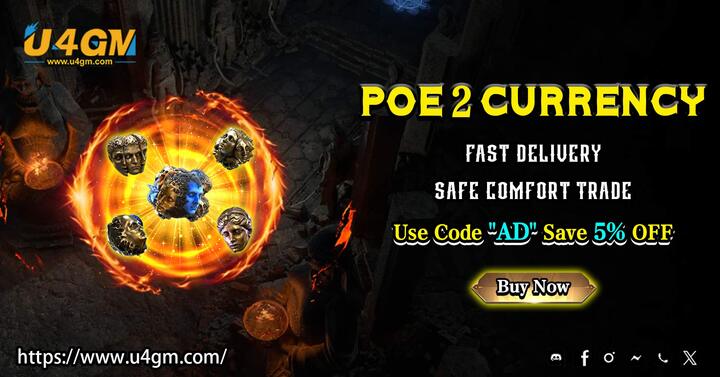الفئات
العلامات
الأرشيف
Can Path of Exile 2’s Currency Be Traded for Loot or Gear Upgra
-

Path of Exile 2's currency can be used to trade for loot and gear upgrades, just like in its predecessor. The game continues Path of Exile's signature barter-based economy, where traditional "gold" is replaced by various crafting and modification items that hold intrinsic value. These currency items not only serve as a means of trade between players but also play a crucial role in crafting and upgrading gear.
1. Trading Currency for Loot in the Player Economy
In PoE 2, the primary way to acquire upgraded gear using currency is through player-to-player trading. Some key aspects include:
- Standardized Trade Currency – Just like Divine Orbs, Exalted Orbs, and Chaos Orbs in PoE 1, PoE 2 will likely have a few high-demand currency items that serve as the primary medium of exchange.
- Buying High-End Items – Players will be able to trade valuable currency for powerful rare, unique, or crafted items that suit their build.
- Bulk Trading – Some mid-tier currencies, such as those equivalent to Chaos Orbs, may be commonly used for bulk trading lower-end upgrades.
- Specialized Items and Builds – Some rare crafting currency will likely be used to purchase gear with specific modifiers, catering to different builds.
PoE 2 may introduce improved trading systems or new mechanics that allow for more seamless transactions, but the fundamental concept of using currency to buy loot from other players will remain.
2. Vendor Transactions: Trading Currency for Gear
In addition to player trading, vendors in PoE 2 will continue to offer a way to acquire gear in exchange for currency. This includes:
- Vendor Recipes – Some vendor recipes allow players to exchange specific currency items or components for gear upgrades.
- Buying Gear with Currency – Low- and mid-tier items may be purchasable from vendors using specific currency types like Orbs of Transmutation, Alteration, or equivalent PoE 2 currencies.
- Crafting Bases – Some vendors may offer high-level white items or specific bases that can be crafted into powerful gear using currency items.
While vendor-purchased gear is unlikely to match the quality of high-end player-traded items, it can serve as a stepping stone for early progression.
3. Crafting Upgrades: Using Currency to Improve Gear
Currency in PoE 2 is not just for trading—it plays a direct role in crafting and modifying gear, making it a core part of gear progression. Some ways currency affects upgrades include:
- Rolling Better Modifiers – Orbs that re-roll item properties, such as the equivalent of Chaos Orbs or Exalted Orbs, will be crucial for optimizing rare gear.
- Upgrading Item Rarity – Currency like Orbs of Alchemy (or a PoE 2 equivalent) will allow upgrading normal (white) gear into rare (yellow) items with randomized modifiers.
- Influence and Special Modifications – If PoE 2 retains influenced items, certain currency types will allow modifying and enhancing gear beyond standard modifiers.
- Corrupting and Enchanting Gear – Special currency may be introduced to corrupt, modify, or add enchantments to items, making them stronger but also adding risk.
- Socket and Link Modification – Currency used to adjust gem sockets, colors, and links will remain vital in PoE 2, allowing for the optimization of gear setups.
Crafting allows for customization and optimization, making it one of the most effective ways to use currency for gear progression.
4. Gambling and Luck-Based Upgrades
Like PoE 1, Path of Exile 2 may introduce currency-based gambling mechanics for gear acquisition. This could include:
- Rerolling Unique Items – A currency item that transforms an item into another unique of the same type could exist.
- Mystery Item Vendors – Vendors may offer unidentified items in exchange for currency, adding an element of risk and reward.
- Tainted Currency – If PoE 2 retains corruption mechanics, some currency may allow risky modifications to gear that can yield powerful results.
- League-Specific Gambling Mechanics – Some challenge leagues could introduce temporary gambling systems, like Path of Exile 1’s past mechanics (e.g., Rog’s crafting in Expedition League).
While gambling with currency can sometimes lead to powerful upgrades, it’s a high-risk, high-reward strategy compared to direct trading or crafting.
5. Special Currency for Endgame and Boss Upgrades
Endgame content in PoE 2 may introduce specialized currency used exclusively for obtaining or upgrading high-tier loot. This could include:
- Currency That Enhances Boss Drops – Some high-end bosses may have mechanics where using a special currency item before the fight increases the quality or quantity of loot dropped.
- Exclusive Raid or Dungeon Currency – If PoE 2 introduces new dungeon-style content, specific currency could be required to unlock or enhance encounters, affecting the loot gained.
- Atlas-Specific Currency – If PoE 2 retains the Atlas system, certain currencies might improve map rewards, similar to how Scarabs work in PoE 1.
- Shard-Based Currency for Endgame Gear – Some of the best loot might be obtained by collecting fragments of rare currency items and combining them for a powerful upgrade.
These special currencies will likely be farmed through high-difficulty content and used strategically to maximize loot.
Currency is Essential for Gear Progression
In poe 2 currency, currency will remain the backbone of both trading and gear upgrades. Whether through player-to-player trading, vendor exchanges, crafting, or gambling mechanics, players will use currency to acquire, modify, and optimize their equipment.
The most valuable currencies will likely be those that are:
- Widely accepted in trade – The main trading currency, such as PoE 1’s Divine Orbs, will be used to purchase powerful gear from other players.
- Useful for crafting upgrades – Orbs that allow rerolling or adding modifiers to gear will always be in demand.
-
Essential for endgame progression – Currency tied to high-tier bosses, dungeons, or map enhancements will hold long-term value.
Recommended Article :How to Sustain Waystones in Path of Exile 2: A Player's Guide